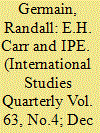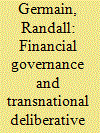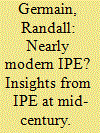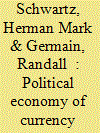| Srl | Item |
| 1 |
ID:
170016


|
|
|
|
|
| Summary/Abstract |
Although the work of E.H. Carr has a prominent place in the scholarly history of international relations (IR), it is notably absent from the discipline of international political economy (IPE). This is puzzling, because Carr's analysis of international politics places a strong emphasis on the organic connection between politics and economics on an international scale. On this reading, his principal publications on IR can also be seen to chart a sophisticated conceptualization of what I want to label historical IPE. This essay retrieves such a reading of Carr for the discipline of IPE. It begins by interrogating the way in which Carr's work has been appropriated by modern IPE scholarship, in order to highlight the limited use made of the political economy dimension of his research. I then explore the historical and political economy aspects of Carr's writings to consider how his contribution might advance recent contemporary theoretical debate in the discipline. I pay particular attention to how his work charts an historical conception of IPE that can synthesize and move beyond the rationalist/constructivist binary that currently dominates theorizing in the discipline.
|
|
|
|
|
|
|
|
|
|
|
|
|
|
|
|
| 2 |
ID:
095619


|
|
|
|
|
| Publication |
2010.
|
| Summary/Abstract |
Recent concern with the institutional underpinning of the international financial architecture has intersected with broader debates concerning the possibility of achieving an adequate deliberative context for decisions involving transnational economic governance. Scholars working within traditions associated with international political economy, deliberative democracy, cosmopolitanism and critical theory have informed this broader debate. This article uses this debate to ask whether the structure of financial governance at the global level exhibits the necessary conditions to support deliberative democracy. In particular, it considers the extent to which publicness and a public sphere have become part of the broader structure of financial governance. Although in some ways financial governance is a hard case for this debate, an argument can be made that a public sphere has emerged as an important element of the international financial architecture. At the same time, the analysis of the role of the public sphere in financial governance reveals important lessons which public sphere theorists and deliberative democracy advocates need to consider in order to extend their analysis into the realm of global political economy.
|
|
|
|
|
|
|
|
|
|
|
|
|
|
|
|
| 3 |
ID:
091624


|
|
|
|
|
| Publication |
2009.
|
| Summary/Abstract |
Many insist that the world economy today is in the grip of the most severe financial crisis since 1931. Although the origins of this crisis are in dispute, the extent and scale of the changes prompted by it are becoming clear. Among these changes are a recalibration of the relationship between public and private authority, a reconfiguration of the regulatory responsibilities and capacities of the state with respect to the financial system, and a rebalancing of relations of power among states. While the financial crisis has generated points of stress along all of these axes of change, we should be wary of expecting an entirely new global financial order to emerge from the carnage. The complex links between financial order and world politics suggest that this financial crisis will result in an evolutionary rather than a revolutionary transformation in the world's financial order.
|
|
|
|
|
|
|
|
|
|
|
|
|
|
|
|
| 4 |
ID:
180352


|
|
|
|
|
| Summary/Abstract |
Disciplinary debates within IPE often leave as an open question how contemporary scholars may build on and incorporate insights from its rich intellectual history. In this article I examine the work of three scholars who are rarely grouped together, but who should be recognised today as engaged in an IPE-inflected debate: Karl Polanyi, E. H. Carr, and David Mitrany. They advanced distinct IPE-centred ways of framing the central problems of the post-1945 world, which are remarkable for how they prefigure important themes in modern IPE scholarship. By assembling and considering their work collectively, I make two arguments: (1) we should recognise their contributions as a precursor to modern IPE; and (2) their work, with certain caveats, provides valuable intellectual resources for contemporary scholars. Their combined work should be considered as part of the common heritage of IPE.
|
|
|
|
|
|
|
|
|
|
|
|
|
|
|
|
| 5 |
ID:
155160


|
|
|
|
|
| Summary/Abstract |
The rise of China has sparked a debate about the economic and political consequences for the global economy of the internationalisation of the renminbi. We argue that the dominant focus of this literature – primarily the external conditions and requirements for a national currency to become an international currency – misspecifies the connections between the international and domestic requirements for currency internationalisation, as well as the potential to become the dominant international reserve currency. We correct this oversight by developing an integrated theoretical framework that highlights the domestic adjustment costs which a state must accommodate before its currency can carry the weight of internationalisation. These costs constitute a critical element of an international currency’s ‘political economy’, and they force states to negotiate contentious social trade-offs among competing domestic claims on finite public resources in a sustainable manner. Our analysis suggests that the likelihood of China being able to successfully negotiate the social costs associated with running a fully internationalised currency is currently very low, precisely because this will place unacceptable pressure on groups benefiting from the economic and political status quo. This further suggests that the American dollar will remain unchallenged as the global economy’s pre-eminent international currency for the foreseeable future.
|
|
|
|
|
|
|
|
|
|
|
|
|
|
|
|